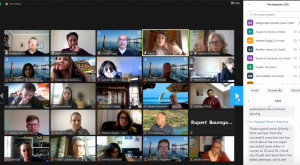For several months, the Pescara organising team had started planning where to take the ESRs, which hidden corners of Abruzzo to present to them, what venue to choose (beach or mountain?) and how to organise vegetarian food in the region of Arrosticini (grilled lamb skewers). The anticipation of hosting the whole team lasted only until January, when it was decided that also this workshop, was to be held online. Che peccato! This meant that the Italian flair had to be translated into the virtual space, a challenge the organisers gladly accepted, curating Italian playlists for the breaks, creating an Abruzzo quiz, and using backgrounds of the Abruzzo landscape. What follows below is a synthesis of the five-day workshop to which 18 guest speakers contributed and 42 researchers attended.

The workshop from 12-16 April was titled “Assessing the Sustainability of the Circular Economy”, thus mainly revolving around the question, whether a circular economy would also be a more sustainable one. After the ESRs had shared their research progress on the first day, the second day started with a panel consisting of stakeholders from academia and the public and the private sector.
After lunch, the participants followed a brief virtual tour of a company plant and then spent the rest of the afternoon learning about the different circularity indicators available, applying these indicators in group work sessions and comparing the circularity scores to life cycle assessment results.
Day three started with a session on how to conduct and disseminate academic research in an interdisciplinary and transdisciplinary setting, while the remaining day was dedicated to the dissemination of research to non-academics. In line with the dissemination theme, on the fourth day the participants got more insights into how to ensure their research was communicated to and understood by policy makers. This was followed by a panel session on sustainable and circular finance with representatives from public and private actors active on both European and international level. Thereafter, one of the social and culinary highlights of the week was the circular cooking class, where the participants learned how to cook a delicious meal from food waste.
The final day was dedicated to how to write a grant proposal for future research and closing the workshop with some brief words by the organisers and a collective reflection on the workshop. After the official programme was over, the participants were a invited to join a virtual tour of Abruzzo’s landscape while enjoying brunch.
For some impressions on the workshop and the cooking class, have a look at the Cresting Youtube channel.

